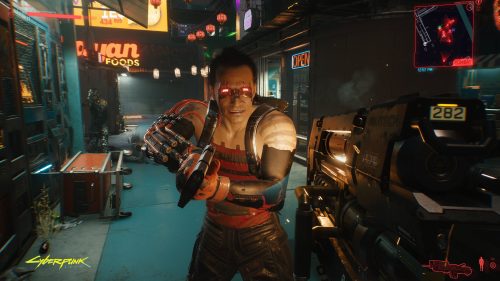
5 AAA Games and Their Budgets: How much was spent, how much was made, and was it worth it in the end.
In the videogame community, it’s impossible to have never heard of an AAA game (commonly pronounced Triple-A game), either during the marketing phase or thrown around amongst gamers. At some point in time, you’ve probably picked one up yourself. The term AAA game is commonly used by big publishers and developers simply as a marketing tactic to deem their game as “better” or “innovative,” but most of the differences between AAA games and indie games simply comes down to the budget and production team behind the scenes. While indie games or smaller developments will have much smaller budgets, AAA games can have an average development budget of around $60 million to $80 million, but many have been known to double, triple, or even quadruple that budget. Some of these games required thousands of employees ranging from programmers, developers, artists, composers, writers, and more, with even more extensive marketing campaigns as well.
However, once a game is created and released, many fans don’t consider the budget that went into creation when purchasing, but many will know whether or not it was deemed as an AAA game during its marketing campaign. The question comes in whether or not a game is truly worth being deemed an AAA game. Is it just the budget that deems whether or not a game is AAA? Is it simply just a tool used by big developers to hype their game up? Or is there something more nitty gritty about the details of development that causes a game to become an AAA game. To analyze these questions, here’s a list of 5 AAA games and their budgets–how much might have been spent creating the game, how much was made, and if fans deemed it to be worthy of that praise.
1.) Assassin’s Creed: Valhalla
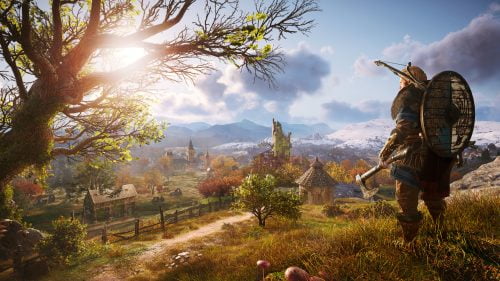
Budget: Not concretely stated, but Odyssey was reportedly around $500 million
Earnings: Around $1 billion at release
Released in November of 2020, most players seem to have enjoyed this installment in the long-standing Assassin’s Creed franchise. Valhalla takes place in a viking-era Norway, following the main character Eivor who seeks revenge against the man who killed their parents and slaughtered their town. During the narrative, Eivor also deals with the political affairs of enemy kingdoms, prophetic visions, and the titular assassins the franchise is known for. Through Eivor, the player engages in snappy, fast-paced combat and a well-written story. According to Google, players seem to have enjoyed this installment, as 89% of Google users liked AC: Valhalla. Although the budget hasn’t been concretely stated, a similar AC project of this size, Odyssey, reportedly had a budget of around an eye-popping $500 million. While that may seem like an unreasonable budget, upon release, AC: Valhalla sold around 17 million copies at $60. Therefore, at around $1.02 billion, AC: Valhalla broke even on release, even with a potentially enormous budget. According to Ubisoft, Valhalla set a record-breaking number of sales, quickly becoming the company’s top-selling PC launch ever recorded. In this case, both the players and the company agree that this AAA game’s large budget was worth it in the end.
2.) The Elder Scrolls V: Skyrim
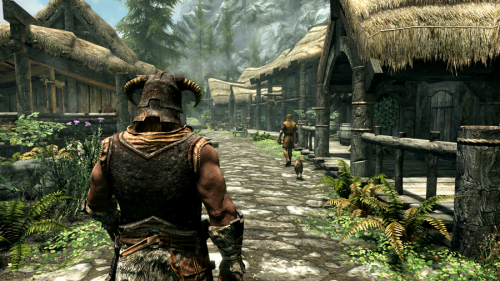
Budget: $100 million
Earnings: $620 million
Released in 2011, Skyrim was the fifth installment in the long-standing and well-known Elder Scrolls series. While the previous installment, Oblivion, also had an impressive revenue count of around $280 million, Skyrim more than doubles that at around $620 million. Set in a nordic inspired fantasy country called Skyrim, 200 years after the events of Oblivion, the player takes on the role as the dragonborn, a mythical human with the ability to learn shouts. The player takes on the quest to defeat Alduin, a dragon that is prophesied to end the world. With an open-world and a heavy emphasis on adventure and roleplay, Skyrim follows the theme of playing the game the way you want, the same way all the installments of the Elder Scrolls series seem to play out. Although the game reportedly cost around $100 million to develop, it seems the fans believe it was worth it. According to Google, around 96% of Google users liked the game and upon release the game received critical acclaim. Years later, Skyrim still remains relevant primarily due to the thanks of modders and DLC content that remasters the game and keeps it fun years after release. Despite the impressive success and revenue, fans are still waiting for the sixth installment in the Elder Scrolls series ten years later, primarily due to the fact that Bethesda seems to be focusing on Elder Scrolls: Online in the meantime. As of right now, the only hope fans have seen for Elder Scrolls VI was a small teaser trailer released in 2018.
3.) Cyberpunk 2077
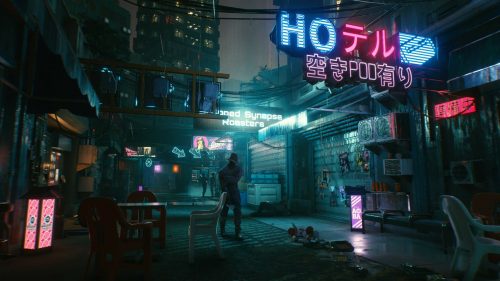
Budget: Roughly $316 million
Earnings: $563 million
Although Cyberpunk 2077’s launch was widely regarded, in the kindest terms, as a shitshow, CD Projekt Red still managed to pull in around $563 in sales revenue after spending around $316 million in budget. The largest concern around Cyberpunk 2077 was the marketing. At first, the game was marketed as an innovative, open-world RPG set in a mature and futuristic cyberpunk world, with the player’s main stomping ground Night City. However, somewhere during the development of the game, the genre was changed from RPG to action-adventure, leaving many fans scratching their heads. Upon release, the game was riddled with hilarious game-breaking bugs, the main-story campaign was ridiculously short, and the graphics and gameplay was optimized only for new-gen consoles, leaving those with older consoles playing on choppy, low-quality graphics. According to Google, however, around 71% of Google users liked the game. While that may seem like a pretty decent average when considering the launch the game had, in comparison to other averages on this list the game performed very poorly. With media and reviews also displaying player dissatisfaction, in this case the Triple-A eye-popping budget was not worth it for most. However, it can be easy to blame the developers when it comes to Cyberpunk 2077’s downfall. However, the amount of times the game’s release was delayed, along with the pandemic happening at the time, it was clear that the development team was crunching hours on a game that just simply needed more time to be developed. But that wasn’t the team’s fault, per se. The truth of the matter is that due to the budget and due to the marketing and hype surrounding the game, those at the corporate level likely pushed the game to be released when it wasn’t ready. Many gamers can vouch, though, that most would like a game to be bug-free and optimized before release, and with a well-paid, well-rested, and no-crunch studio behind it, too.
4.) Red Dead Redemption 2
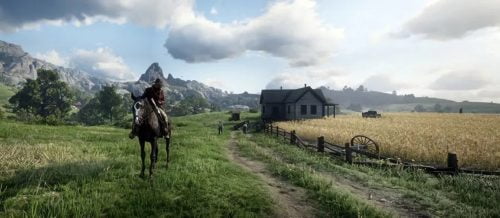
Budget: $80 to $100 million, while some sources reporting as high as $300-$500 million
Earnings: Around $1 billion
The long awaited prequel and second installment to Red Dead Redemption was released in 2018 and received universal acclaim from critics and fans alike, making it an extremely well-received sequel. Although it had expectations to live up to, both as the prequel to the first game and with a budget of up to $100 million, RDR 2 seemed to live up to the hype. Set in a fictional recreation of the Old West in 1899, RDR 2 centers around the story of Arthur Morgan and the notorious Van der Linde gang. After a robbery goes wrong, the gang is thrown into turmoil and decline as they deal with lawmen, rival gangs, and… swamp zombies. With a stunning open-world and an immersive, well-crafted story, Red Dead Redemption 2 was worth both the wait and the budget, for Rockstar Games and fans alike. According to Google, 96% of Google users liked the game. For a Triple-A game, this one seemed to be worth both the marketing and budget.
5.) The Witcher 3: Wild Hunt
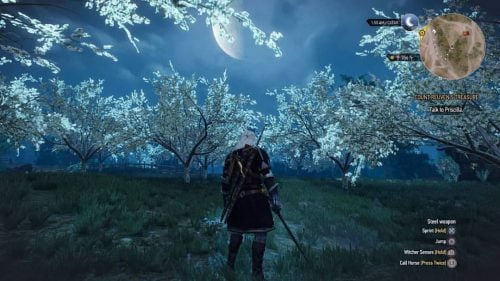
Budget: $81 million
Earnings: $200 million
Are AAA games worth it in the end?
Another CD Projekt Red game for the list, The Witcher 3: Wild Hunt had a much better reception than Cyberpunk 2077. The Witcher series is the game franchise that threw CD Projekt Red into becoming a major league development studio. Originating as a book series written by Andrzej Sapkowski, The Witcher franchise follows the story of Geralt of Rivia, a white-haired legendary witcher who is thrown into a story of fate, family, magic, and lots and lots of monster-fighting. Marketed as an action role-playing game, the third installment in the series, The Witcher 3: Wild Hunt follows the story of Geralt as he aims to protect his adopted daughter, Ciri, who is running from a mythological Wild Hunt. With dynamic environments and advanced artificial intelligence, The Witcher 3: Wild Hunt was a game that set the expectations for CD Projekt Red. However, this game performed much better than Cyberpunk 2077, according to Google around 95% of Google users liked The Witcher 3: Wild Hunt, making its impressive budget seem worth it in the end. With the success of The Witcher 3 and the fail of Cyberpunk 2077, it calls into question the validity of marketing a game as AAA. While both had impressive budgets, one was clearly more polished and ready for release than the other, but both had the expectation of being a well-developed, well-funded game.
With this list in mind, we can see that there are some games with high budgets that tend to perform better than others. However, all are marketed as Triple-A games, leaving consumers to decide whether or not the game is worth purchasing in the end. However, with such large budgets and strategic marketing, AAA games tend to be pricier than indie games and many will even take some form of pre-ordering into account. For some games, this pre-order works out if the released, final product lives up to consumers’ expectations. However, in the case of Cyberpunk 2077, many felt duped that this AAA game was marketed to be amazing, innovative, open-world, immersive and ended up pre-ordering a game that did not live up to their expectations. With Cyberpunk, the case is more severe than other disappointing games, since some bugs upon release were entirely game-breaking. Still, as I personally had finished playing the main campaign in all of ten to twelve hours while still playing side missions and roaming around, I felt that the game’s steep price just simply wasn’t worth it.
For me, this makes the culture and hype surrounding AAA games a bit trickier. While the marketing and budget are there to back the hype up, these games tend to have a harmful environment surrounding them both with consumers and developers. While consumers may be duped into pre-ordering an expensive game that doesn’t live up to the hype, developers, artists, writers, and programmers are forced to work overtime and “crunch” to make these games presentable for release. With such steep budgets, one would think that these developers would be able to sustain a reasonable work schedule, but many are overworked, underappreciated, and underpaid. This leaves one to wonder if AAA means anything at all when labeling a game, or if it’s simply a way for big videogame corporations to market their game as “innovative” and “better,” while mistreating their development team to get there. As is commonly the case, a bigger budget does not necessarily mean a better game, as many critically acclaimed indie games such as Stardew Valley or OneShot were created with little to no budget. Therefore, it’s important to take a look at the culture and expectations surrounding AAA games. What really makes an AAA game different from the others? Is it marketing, budget, or the development team behind it? More importantly, we should analyze the culture behind AAA games to realize that, sometimes, the pressure and the hype of creating an amazing game can leave unfair expectations on the team behind the scenes, leaving many developers underappreciated and overworked. If bigger budget games means mistreating workers to the point of exhaustion, AAA games might simply just not be worth it in the end.
Notice: Undefined variable: user_ID in /hermes/bosnacweb04/bosnacweb04au/b1979/dom.bigorangedesign/wp_site_1589834241/wp-content/themes/zox-news/comments.php on line 49
You must be logged in to post a comment Login